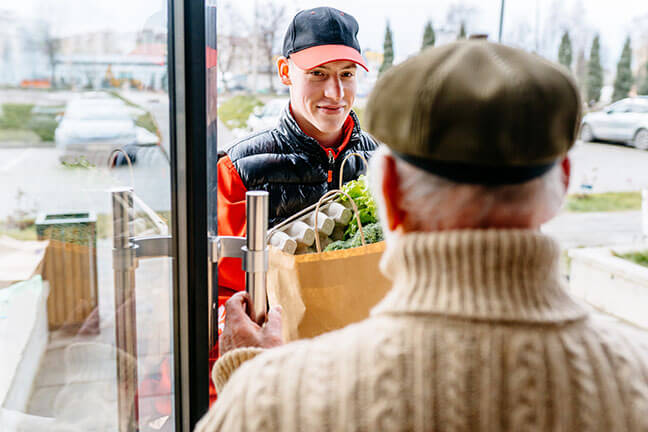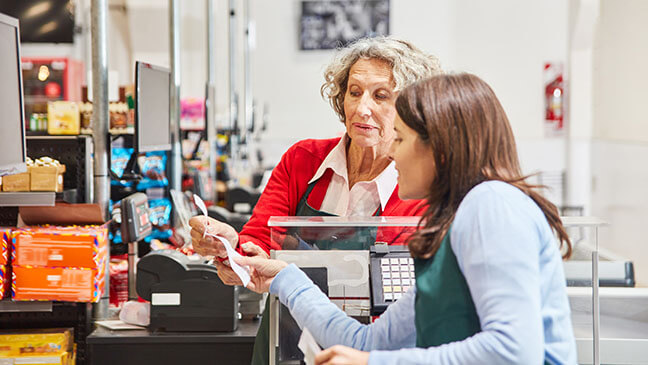Making sure you have nutritious food on hand is essential, but grocery shopping can be difficult for many older adults. From getting to the store to lugging heavy bags, it presents physical and logistical challenges. Fortunately, seniors have many options to access assistance with their grocery shopping.
This guide will cover tips for food shopping for the elderly, in-store shopping, meal delivery, grocery delivery services, specialized shopping assistance programs, discounts, benefits programs that help pay for food, and even how to get free cell phone service to stay connected and access online options.
With planning and support, you can get the groceries you need conveniently and affordably.
In-Store Shopping Tips for Seniors
For seniors who prefer or are able to shop in person, stores offer resources to make the experience easier:
- ADA Accessible Carts and Motorized Carts: Check for wider carts and scooters to aid mobility while shopping.
- Accessible Parking Spaces: Look for designated close-in parking spots.
- Store Associates: Request help locating items, bagging groceries, and loading bags into your car.
- Senior Shopping Hours: Many stores open early for older shoppers when stores are less crowded.
- Shopping Lists: Make organized lists grouping like items to minimize backtracking.
- Budgets: Scope circulars and ads to find bargains and plan spending.
- Checkout Help: Ask cashiers to divide heavy items into multiple lighter bags.

Grocery Delivery Options
Grocery delivery services provide a convenient way for seniors to get the items they need without leaving home. With grocery delivery, you can still get all your favorite foods and essentials without the hassle.
Popular nationwide services include:
Instacart – Access to Grocery Stores
Instacart offers same-day delivery from local stores like Kroger, Albertsons, Costco, CVS, and more. You place orders online or via app. You can save a digital shopping list to conveniently re-order each time.
Walmart Delivery
Walmart Delivery allows customers to order groceries online and have them delivered to their door. Walmart personal shoppers pick out fresh produce, refrigerated goods, pantry items and more, then deliver from the local Walmart store so customers get their regular grocery haul without leaving home.
Amazon Fresh
Grocery delivery from Amazon’s own grocery stores in select areas. It also integrates with Whole Foods.
Benefits include contactless delivery and the ability to tip drivers. Delivery fees start around $3.99 but vary by provider. Consider delivery if shopping in stores poses challenges.
Amazon Prime members may be able to avoid charges on groceries delivered in certain areas.
Organization Providing Grocery Shopping Assistance
Grocery shopping assistance programs provide help with grocery deliveries for seniors who need support completing this essential task.
For ongoing help shopping for groceries, specialized assistance programs exist:
- Local Senior Centers: Many plan regular grocery shopping trips with transportation included.
- Area Agencies on Aging: Local AAAs assist seniors with rides, chores, errands like grocery shopping, and referrals to discounted meal services.
- Senior Villages: Member-based nonprofits coordinate volunteers to provide grocery shopping and delivery through local partnerships.
- Churches: Congregations may have ministries assisting elderly members with routine needs like grocery shopping and running errands.
- Geriatric Care Managers: Social workers act as personal advocates to arrange assistance services for seniors.
- Home Health Aides: In-home caregivers can do hands-on tasks like grocery shopping and meal prep.
Explore programs in your community. Costs vary based on services utilized but assistance is available.
Hire a Personal Shopper
For seniors who want more personalized and hands-on grocery shopping assistance, hiring a personal shopper may be the answer. A personal shopper will go to the grocery store for you, hand-pick your items, and deliver the groceries to your home. This ensures you get exactly what you need and want every time.
Personal shoppers can also help with meal planning, creating customized shopping lists, finding bargains and discounts, and carrying heavy bags. It is a more tailored form of grocery assistance. Rates vary, but personal shoppers typically charge an hourly fee or a percentage of the total grocery bill.
You can find experienced personal shoppers to hire on sites like Instacart.com and TaskRabbit.com. Browse shopper profiles, reviews, and hourly rates to choose the right fit for you. The sites also provide insurance coverage and assistance if any issues arise. Hiring a delivery person takes the hassle out of grocery shopping while still maintaining control over your grocery selections.

Finding Discounts on Groceries
A variety of discounts can help seniors save money on grocery costs:
- Senior Discounts: Stores like Kroger, Albertsons, and Publix offer senior discounts on certain days.
- Coupons: Clipping coupons saves on name brands. Online sites also offer printable grocery coupons.
- Loyalty Programs: Sign up for rewards programs from stores you frequent to earn future discounts.
- Sales: Check weekly circulars for deals on items you regularly buy and stock up.
- Generic Brands: Opt for cheaper store brand items when possible with basics like milk, bread, produce.
- Food Banks: Donated groceries are available for low-income seniors struggling with food costs.
Every dollar counts when grocery shopping on a budget, so take advantage of whatever discounts you can.
Benefit Programs to Help Pay for Groceries
Federal and state programs also provide food assistance:
Supplemental Nutrition Assistance Program (SNAP)
The Supplemental Nutrition Assistance Program (SNAP) provides monthly grocery benefits to low-income seniors who meet eligibility requirements. The average SNAP benefit is $121 per month per person, offering crucial food assistance to older adults in need.
SNAP benefits can be used to purchase most food items at grocery stores, convenience stores, farmers markets, and other retailers that accept SNAP. Eligible foods include breads, cereals, fruits, canned vegetables, meats, fish, poultry, dairy products, and seeds and plants that produce food.
However, SNAP benefits cannot be used to purchase alcoholic beverages, tobacco products, vitamins, medicines, supplements, live animals, pet foods, cleaning supplies, paper products, cosmetics, or prepared foods. There are some exceptions – certain snack foods, soft drinks, candy, as well as seafood, steak, and bakery cakes are now included. But the focus remains on nutritious staple foods for the household.
When checking out, SNAP recipients simply have to inform the cashier they will be using their Electronic Benefits Transfer (EBT) card. The card allows recipients to access their unique food allowance each month to make grocery purchases
Meals on Wheels
Meals on Wheels is a program that delivers nutritious meals to seniors age 60+ who are homebound or unable to shop and cook for themselves. Volunteers deliver well-balanced meals on a regular schedule each week, usually around the noon hour, to ensure seniors have healthy food access and human connection.
Medicaid Home and Community Based Services (HCBS) Waiver
The Medicaid HCBS Waiver provides long-term care services that help older adults remain living at home. Waiver participants may qualify for assistance with groceries, meal preparation in home care, and other services that support independence.
Older Americans Act Nutrition Programs
The Older Americans Act funds local community nutrition services for seniors 60+ through programs like Meals on Wheels. These federal programs help seniors get access to healthy meals, nutrition education, and nutritious food to stay healthy as they age.
Check Benefits.gov to explore eligibility. These programs help cover costs if affording food is a challenge.
Medicare Advantage Plans
Some Medicare Advantage plans include supplementary benefits beyond just medical coverage, such as allowances for over-the-counter items and grocery store purchases. These extra benefits help pay for essentials and may provide monthly allowances or debit cards to reduce out-of-pocket grocery costs. Check with your licensed agent if these types of plans are available in your area.

Getting FREE Cell Service with EASY Wireless
Lifeline and the Affordable Connectivity Program are Federal assistance programs providing discounts to certain wireless providers on the cost of cell phone and data services. EASY Wireless uses these discounts to provide free monthly cell phone and data service to qualifying customers.
Learn how you can qualify for this FREE service at EASY Wireless.
Grocery Shopping Doesn’t Have to be Difficult
Hopefully, this guide provided helpful tips for conducting your essential grocery shopping as a senior. From utilizing in-store resources to grocery delivery to specialized shopping assistance programs, discounts and benefits, you have options to access food conveniently and affordably.
Reach out to local organizations and service providers to find a grocery shopping solution that works for you!


